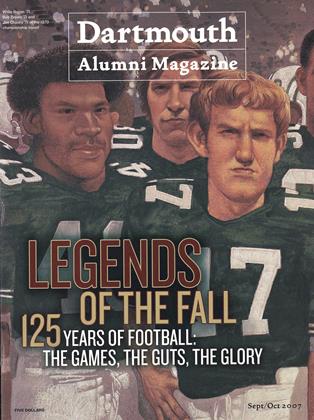Unforgettable!
The most famous game in Dartmouth history? Easy—the 1940 contest against Cornell. When the dust finally settled, freshman Howard Leavitt ’43 provided this eyewitness account in a letter to his parents.
Sept/Oct 2007 HOWARD LEAVITT ’43The most famous game in Dartmouth history? Easy—the 1940 contest against Cornell. When the dust finally settled, freshman Howard Leavitt ’43 provided this eyewitness account in a letter to his parents.
Sept/Oct 2007 HOWARD LEAVITT ’43THE MOST FAMOUS GAME IN DARTMOUTH HISTORY? EASY-THE 1940 CONTEST AGAINST CORNELL. WHEN THE DUST FINALLY SETTLED, FRESHMAN PROVIDED THIS EYEWITNESS ACCOUNT IN A LETTER TO HIS PARENTS.
DEAR FOLKS,
The highlight of this past week has been the Cornell-Dartmouth football game. Last week before the game the spirit of the team and student body had reached a nadir. We had lost to so many teams that we were at the bottom of the Ivy League. The prospect of playing one of the best teams in the country was ridiculous. Students sold their tickets right and left and arranged to leave for the weekend. The Daily Dartmouth wrote a pessimistic editorial... and predicted that Cornell would win by four touchdowns.
Saturday dawned murky and drizzly. I decided to forego the game, sell my ticket and study. However, at the last minute I changed my mind and was able to buy a ticket for $1 from a desperate student. (I had sold mine earlier for $3.)
Cornell's Coach [Carl] Snavely was simply wild because he couldn't figure out our new complicated defense. Toward the end of the first half our team made a field goal. The stands went crazy. The referee had to ask the stands to be quiet, as the players couldn't hear the signals.
When the Cornell team came back from the half you could see that there would be no more fooling around. The game looked as though it was safely in our hands when, with five minutes to play, Cornell started a drive. They couldn't do anything on the ground so they took to the air. It was snowing by this time so that passing with a wet ball was no easy matter. Cornell made first downs and finally they were at our 8- yard line. Then came a terrifying pass, which was incomplete. Finally third down brought them to our half-yard line. You cannot imagine the amount of tension in the crowd. At this point I, and most of the crowd, lost track of the downs. The score-board had ceased to function...there were about 15 seconds left to play. A Cornell man faded and threw a pass into the end zone. In the nick of time it was knocked down. We weren't sure if the game was over or not. We saw the referee put the ball back at the half-yard line. With five seconds to go Cornell called a time-out and was imposed a five-yard penalty for too many time-outs. The next play was a pass and it was good. The kick was converted, so the score stood 7-3. The letdown was terirific. Then followed an impressive event, one that I shall never forget. The Dartmouth stands followed its usual tradition of singing "Men of Dartmouth." We had lost despite a terrific struggle, yet everyone stood up and sang the alma mater with heads bared.
That night an astonishing rumor circulated. Cornell had won on a fifth down. The news spread like wildfire. Rumors had it that the coaches were having a terrific argument over the charts and movies of the game. But the evidence soon became overwhelming. Another question arose—would Cornell concede the victory if the decision were reversed? It had won 18 games straight. President of Cornell [Edmund Ezra] Day (a
1905 Dartmouth graduate) declared that they would concede if the referee changed the decision. Finally on Monday afternoon, two full days after the game, the official word arrived that we had won. Then commenced one of the greatest celebrations in the history of the College. At the first rally at 5:30 p.m. the crowd of students marched to the President's House and cheered him. The second rally was at 8 p.m., the third at midnight and the fourth at 3 a.m. At the last rally someone soaked an old couch with gasoline and lit up the streets while students snake-danced around the campus. I didn't sleep much that night, due to the tolling of the chapel bells and the continual blaring of band instruments. The game was in the news for days and newsmen nationwide expressed frustration that they had not provided coverage. This had to be the Dartmouth football win of the century.
Love to all, Howard
BLOWN CALL An error by officials allowed Cornell to score a touchdown on what was later realized to be a fifth down.
HOWARD LEAVITT is a former Boston University professor and WorldBank consultant now retired and living in Pelham, Massachusetts. His latestbook, First Encounters: Native Voices on the Coming of the Europeans (Greenwood Press), will be published next year.
 View Full Issue
View Full Issue
More From This Issue
-
 SPORTS
SPORTSThat Championship Season
September | October 2007 By RALPH WIMBISH -
 Feature
FeatureFantastic Four
September | October 2007 By C.J. Hughes ’92 -
 Feature
FeatureThe Ultimate Dartmouth Football Player
September | October 2007 By Bruce Wood -
 SPORTS
SPORTSRITES OF AUTUMN
September | October 2007 By Courtesy Dartmouth College Library -
 Feature
FeatureNotebook
September | October 2007 By THOMAS AMES JR. '74 -
 Feature
FeatureAlumni News
September | October 2007 By Kristine Keheley '86
Features
-
 Feature
Feature"AN OUTSTANDING FOUNDATION UPON WHICH TO BUILD"
December 1961 -
 Feature
Feature"Your Business Here..."
NOVEMBER 1962 -
 Feature
FeatureB & G
NOVEMBER 1981 -
 Feature
FeatureNathan's Body Shop
DECEMBER 1997 -
 Cover Story
Cover StoryMICHAEL MORIARTY ’63, ACTOR
March 1980 By Keith Bellows -
 Cover Story
Cover StoryStranger in the Land
Jan/Feb 1981 By Rob Eshman


